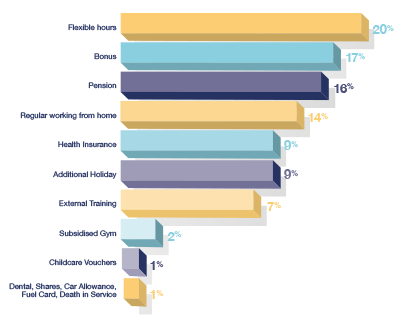
Employee expectations are higher than ever. In London in 2019, employment is at record highs, mirrored by record unemployment. And that’s coupled with a ton of B2B marketing jobs being advertised.
Why? Well, London is still seen as a great place to set up your Tech Startup. The UK is business-friendly, and London, in particular, offers access to a lot of good talent. So competition for that potential is fierce with jobs going unfilled.
Plus, everyone wants their very own B2B marketer. According to many reports, traditional sales techniques are becoming less fruitful, and marketing is stepping up and taking more control of the revenue generation funnel. Who wouldn’t want a B2B marketer that can drive sales and give you a greater return on your investment? So it’s no surprise that the best B2B marketers are in high demand.
In this blog, we’ll outline what higher employee expectations mean for your business. Because getting the perspective of what B2B marketers are looking for, over and above a salary, is critical to you sourcing and hiring the very best people.
Every employee that starts a new job has expectations about it. This can be as simple as the salary, hours or who your line manager is. But asides from standard contractual information, an employee also makes a psychological contract with you and your company.
A psychological contract is arguably more important because it’s the intangible aspect of how the relationship will work between you and the employee, and how you behave towards the them.

So, when your new B2B marketer joins your company, their expectations will be based on a combination of what they read in their employment contract and what’s been said and how it’s been interpreted.
And employee expectations must be realised otherwise it’s more than likely your B2B marketer won’t stay with your business for long.
So now we’ve discussed what employee expectations are, we’ll now move onto what those expectations are for B2B marketers.
Having good employee benefits is a key factor in whether job seekers will be interested in your job opportunity in the first place.
Whilst your culture and the working environment are just as, if not more important, at this very early stage they’re not as important as your employee benefits. These include things like salary, bonus, holidays, pensions, healthcare etc.
So when a B2B marketer is discussing a new job opportunity with them, the initial focus will be on the job itself, and next it will be the salary and bonus.
In the current market, we’re seeing candidates get an uplift on their base salary of anywhere from 7-12 percent by moving to a new job. Of course, some people will move jobs for the same salary or even less, but because the demand for B2B marketers is high, wages are being pushed higher.

Being paid a bonus as a B2B marketer is more common than not. In our 2019 Salary Survey, we found that 67 percent of marketers were paid a bonus. And the benefit for employers today is that it’s far easier to measure the impact a B2B marketer has. So bonuses can be tied to tasks and goals achieved.
Of the B2B marketers that were paid a bonus, the average amount was 14.6 percent of their annual salary. With most bonuses being paid annually.
But the benefit you’ll get as an employer of paying a bonus goes way beyond the amount you’ll pay. Because B2B marketers are becoming more influential in a company’s strategy and growth, it’s fair to give them a share of what they produce. Could you imagine not paying a salesperson a bonus? So, showing recognition to your marketer for the tangible contribution they’ve made to the growth of your business is a great way to motivate them, make them feel valued, and most likely extend their time with you.
As for further benefits, you’ll see that B2B marketers, in our Salary Survey, valued flexible working most frequently as the most important benefit to them.

It’s important to note that benefits like pensions are becoming more important for employees. Yes, most employers have to pay into an employees statutory pension under the new government auto-enrolment regulations, but the percentage they have to contribute is nominal.
Living costs, especially for people living in London, have continued to outstrip wage growth, so many employees can’t afford to invest their own salary in their pension. So working for an employer who contributes a percentage of an employees salary into their pension without them having to do so, is a big selling factor for job seekers.
Likewise, it’s important that holidays are reasonable. We all need some downtime from work to enjoy spending time with our families and to recharge our batteries – and 20 days holiday, plus bank holidays no longer cuts it. Fortunately, most employers offer 25 days holiday now, and we’d highly recommend doing that if you currently don’t.
The working environment is hugely important to B2B marketers, as we’re sure it is to most employees. By offering a positive working environment, you’ll find that your employees are happier and look forward to coming into work. If your company suffers from a high absence rate, then it’s a telltale sign that you may need to look at this.
Generally, if you’re happy outside of work, you’re more likely to be happy at work, and vice versa. Having a good balance between work and what you do outside of it gives you the ability to enjoy both. We all live in a very fast culture, with long commutes and demanding workloads. So having the right amount of time to spend with your family, support charities, work on personal projects or spend time with friends, will help bring happiness to your workplace.
Plus, as an employer, the experiences that your employees have outside of work will help shape them into better people. They may have more empathy, bring more creativity, or be able to solve problems better.

Regardless of whether you pay your marketer (or other employees) a bonus, it’s important as a senior business leader, to offer regular praise when it’s due. Often, plans can change, extra hours may be required to set up an event, or staff may need to stay late to help the sales team achieve their quarterly goals. Whatever the reason, employees are more happy to do that when recognition is shown. And it fosters a sense of feeling valued.
Giving recognition at work can be done in many ways;
Great employees are hard to come by so implementing one or more of these tactics is a great way to retain them.
B2B marketers, in particular, are always thirsty to develop their skills and knowledge. Marketing doesn’t stand still, There are new tactics, channels and technologies to learn. So helping your marketer stay on top of those changes, is a great way to keep them motivated and help your business grow through new ideas at the same time.
For businesses that take training seriously, this means giving each employee a set development fund to use throughout the year. The employee can then decide what areas they need some further development in and use the money to attend events, complete courses and develop their skills.
Specifically for B2B marketers, that could mean sponsoring a junior marketer through their Chartered Institute of Marketing (CIM) qualification, or someone with more experience through the various levels they offer.

You’ll often hear candidates say that working for their company is more like being part of a family. And when that happens, it’s a sign of when there’s a good cultural fit between the employee and the employer.
And a great cultural fit has many benefits for both parties, including happiness, work ethic, loyalty and the results delivered.
But culture can often be a hard thing to define. When you ask a business what their company’s work culture is like, it’s not uncommon for them to roll off a load of words with very little meaning to them.
However, you can often find that the best companies do certain things which helps foster a culture that the very best employees expect.
In many B2B Technology companies, teams can work in silos. And that’s arguably never more apparent than across sales and marketing. For companies to grow, their sales and marketing processes must be aligned. Yet, more often than not, there’s never enough alignment which can, unfortunately, lead to slower growth.
So it’s important to marketers and many types of employees to work for a company that promotes teamwork. Both within their respective disciplines (sales, marketing, operations and finance), and also across the whole company.

And that’s encouraged by the senior leadership team. It means giving a platform for employees to share their ideas, a leadership team who listen, and a CEO / Founder that promotes and encourages working collaboratively. Problems can often be solved quicker and more effectively by getting people to work together.
If someone gets promoted because they’re seen to be good friends with the CEO, rather than being the best qualified, then it can lead to disgruntled employees which will never end well for your company’s culture.
So having a clear process for rewarding and promoting your employees based on merit is crucial. Plus, it’s also good for employees to see that you like to promote people from within because it encourages them that they can have a career with your business.
A hot topic at the moment, and something we’re seeing more of. Giving your marketers and employees the ability to work flexibly is fast becoming an expectation. That could mean working slightly different hours to allow parents to drop their children at school or giving people the ability to work from home for one day or more, saving them the commute into work.
Giving this flexibility shows you trust your employees, and that output and being successful is more important than being nailed to your desk for a specific set of hours.
And especially if you’re a startup who can’t compete with the salaries and benefits that more established businesses can offer, giving this flexibility can be a huge pull for the most talented marketers out there.

It’s no doubt that employee expectations are on the rise. With the proliferation of sites like Glassdoor, it’s much easier now for disgruntled employees to vent their anger in a way that can harm your business.
So it’s even more important to make sure you’re offering additional benefits to your employees over and above a basic salary. And then making sure you maintain your culture as you grow.
Because if you get those things right, and an employee’s expectations are met (or surpassed), then you will end up hiring a better calibre of person, keeping them in your business for longer, hiring less and become more profitable.
Subscribe to our fortnightly newsletter to hear about our latest podcasts, blogs, career advice & jobs.